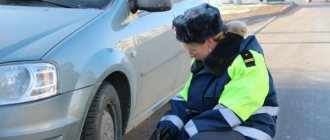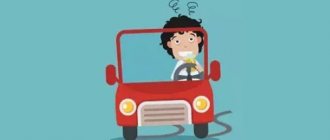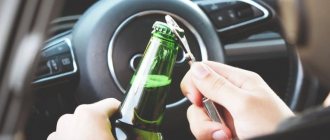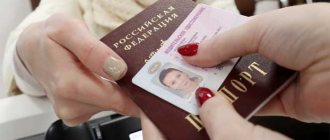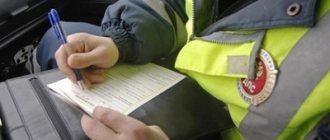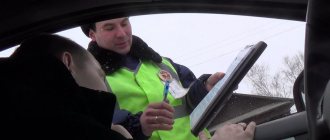Revocation of a driver's license is a very broad and complex area of administrative law. Here it is important to understand where the calculation of the period begins, when it ends and what affects it.
For a motorist, a bad dream is one where he is deprived of his driver's license. Not all articles of the Code of Administrative Offenses of the Russian Federation that affect traffic violations provide for this form of punishment in the sanctions part. Here it is important to understand for what violations this sanction is provided and the maximum period for deprivation of the right to drive a vehicle. The driver, among other things, needs to know how to behave correctly in such a situation and what to pay attention to.
Overtaking in the oncoming lane
Driving into the oncoming lane is recorded by traffic police officers. The punishment is temporary deprivation of rights:
- from 4 to 6 months for a single violation;
- up to 12 months, if the driver commits a repeated violation (within one year).
If the violation is recorded by a video surveillance camera, the motorist will face a fine of 5 thousand rubles.
You can end up in the oncoming lane by mistake. For example, starting a turn too early.
When does the period of deprivation expire?
First of all, you need to determine the moment when the period of deprivation begins, as discussed above.
Well, then calculating the end of the period is a matter of technology. Simply take the start date of the period of deprivation and add its duration to it.
For example, if the period begins on July 20, 2021, and the duration is 4 months, then the period of deprivation expires on November 21, 2021. You can pick up your license starting November 21. If the period of deprivation expires on a weekend, then you can pick up your license on the first next working day.
Over speed
One of the most dangerous and common violations. Deprivation of rights threatens only if speeding is recorded by traffic police officers.
Dear OSAGO? Restore KBM now
and stop overpaying insurers!
The service will send an application to RSA. Recovery time for KBM: from 12 hours. Find out more
- If you exceed the speed limit by more than 60 km/h once, your license will be revoked for a period of 4 to 6 months;
- Repeated violations are punishable by up to 12 months.
- If the excess is recorded by a video surveillance camera - a fine of 2500-5000 rubles (exceeding by more than 60 km/h).
does not to fines for speeding by more than 60 km/h .
What to do after losing your driver's license
Live as before, but instead of driving, switch to public transport. Or transfer the right to drive a car to another person (family member, friend) and drive with him.
Driving a car after revocation of a driver's license is, of course, not allowed. And if a driver decides to “outsmart” the legal system and gets behind the wheel, he faces serious sanctions. According to the law, a “cunning person” who is stopped by traffic police officers can be punished with a large fine of 30 thousand rubles or put under arrest for 15 days. They may also be subject to forced labor: instead of traveling in a car, the offender will have to sweep the streets or perform other socially useful work for up to 200 hours.
“Most often, courts impose punishment in the form of a fine,” comments lawyer Lev Tropin. “But if the offense occurs repeatedly, administrative arrest cannot be avoided.”
The situation is even more serious with those who get behind the wheel after being deprived of their license for drinking alcohol and are again caught by the traffic police officers “in the dark.” In this case, it will no longer be possible to get rid of administrative liability. The punishment will be criminal, much more severe than before.
Avoiding obstacles and public transport
Often, country roads are equipped with single-lane roads. Consequently, public transport that drops off passengers at the curb briefly blocks traffic on the only lane. An attempt to bypass the vehicle will be perceived as entering the oncoming lane and will result in the deprivation of your license.
A similar situation arises when driving around a faulty car standing on the road, a pile of garbage or an insignificant road defect. These objects are designated as an obstacle.
If it is possible to go around the obstacle in a different way (without crossing the oncoming lane), you can lose your license.
How to do everything right and avoid maximum liability
In order to do everything correctly and avoid imposing a maximum period of deprivation of driving privileges, you need to contact a lawyer immediately after the incident. He will certainly find a way to resolve the issue, because the administrative responsibility of the driver is assigned taking into account the study of the circumstances of the case and the presence of mitigating factors. For example, if a vehicle is the only source of income for a family, then you can expect that the court will take this fact into account and limit itself to awarding a fine. And there are many such nuances, and a human rights activist will be able to highlight those that can protect your interests.
1
2
3
2
3
3
Violation at a railway crossing
Traveling to a closed crossing is subject to a fine of 1,000 rubles. However, more often the court comes to a decision on deprivation of rights.
- For a single violation for a period of 3 to 6 months;
- A repeated violation leaves the driver without the right to drive a vehicle for one year.
You cannot enter the crossing, even if the barrier has not yet lowered (reference point: red/sound signal, traffic controller gesture).
Is it possible to add them up for different traffic violations?
When two protocols have been drawn up against a citizen under different articles of the Code of Administrative Offences, and for both of them a deprivation of a special right has been imposed, the driver should be aware of the following nuances:
- several punishments cannot stack with each other;
- each of the periods of deprivation proceeds sequentially, from the earliest to the latest;
- the countdown of the expiration of the punishment will begin on the calendar day following the entry into force of the Resolution;
- the legal effect of the Decree begins on the 10th day;
- the length of the effective period affects the receipt of a driver's license back;
- The calculation of time limits begins only after the person has handed over the driver’s document.
You can figure out at what point the period for deprivation of a driver’s license begins by knowing several subtleties of the administrative process. The first thing that is important in this situation is the date the court document comes into force. This happens on the 11th day, after the offender receives his copy of the decision in person and signs for it.
The court must have a document signed by the person stating that he was given a copy of it. Otherwise, it will be impossible to talk about the proper execution of court proceedings and the driver will be able to appeal the decision at any time. Reinstating the appeal period will be quite possible if the court does not have evidence of delivery of a copy of the document to the person against signature.
Driving through a prohibitory traffic light
A violation is considered to be driving through a red/yellow signal, prohibiting the traffic controller's gesture and turning when the traffic light arrow is extinguished. The punishment is:
- For a single violation, a fine of 1000 rubles;
- Repeated violation within a year threatens with deprivation of rights for a period of 4 to 6 months (must be recorded by a traffic police officer);
- A repeated violation recorded by a traffic camera is punishable by a fine of 5,000 rubles (the discount does not apply).
Minimum and maximum period of deprivation of rights
There are different periods of driving suspension. Administrative offenses are punishable by the confiscation of a driver's license for up to 2 years. When a person commits an accident that causes the death of a person or causes grievous bodily harm, the license can be taken away for three years. When drunk driving has been classified as a criminal offense, a repeated violation of this type is punishable by deprivation of the license for a period of up to three years.
The minimum term of imprisonment, from 1 to 3 months, is given for the primary violation:
- failure to provide a path for special vehicles giving light and sound signals;
- crossing railway tracks illegally.
Table 1 - Terms of deprivation of driver's licenses
| Period of suspension in months | Violation | Article |
| 1-3 | Driving without license plates | 12.2, part 2 |
| 1-3 | Failure to provide access to ambulances, police or fire trucks giving signals | 12.17, part 2 |
| 3-6 | Incorrect crossing of railway crossings | 12.10, part 1 |
| 4-6 | Failure to comply with the speed limit, exceeding the speed limit by 60–80 km/h | 12.9, part 4 |
| 4-6 | Repeatedly running a red light | 12.12, part 3 |
| 4-6 | Intersection solid | 12.15, part 4 |
| 4-6 | Driving in the oncoming lane | 12.16, part 3 |
| 6 | Failure to comply with the speed limit, exceeding the speed limit by more than 80 km/h | 12.9, part 5 |
| 6–12 | Driving with fake license plates | 12.2, part 4 |
| 6–12 | Non-compliance of car lighting devices with existing regulations | 12.5, part 3 |
| 12 | Repeated failure to comply with the speed limit, exceeding the speed limit by more than 60 km/h | 12.9, part 7 |
| 12 | Repeated incorrect crossing of railway crossings | 12.10, part 3 |
| 12 | Repeated collision with a solid road, its intersection | 12.15, part 5 |
| 12–18 | Illegal installation of special signals on vehicles | 12.5, part 4 |
| 12–18 | Causing minor harm to the health of passengers, pedestrians or other road users | 12.24, part 1 |
| 12–18 | Escape from the scene of an accident | 12.27, part 2 |
| 18–24 | Drunk driving | 12.8, part 1 |
| 18–24 | Handing over a car to a drunk driver | 12.8, part 2 |
| 18–24 | Causing moderate harm to the health of a passenger, pedestrian, or other road users | 12.24, part 2 |
| 18–24 | Refusal of medical examination | 12.26, part 1 |
| 18–24 | Drinking alcohol immediately after an accident | 12.27, part 3 |
Table 2 - Types of criminal violations that result in deprivation of driving privileges
| Term | Violation | Article of the Criminal Code |
| 6–36 | Causing serious harm to the health of a passenger, pedestrian, or other road users; death of the victim | 264 |
| 6–36 | Repeated driving while drunk | 264.1 |
The table shows that the maximum period for confiscation of a driver’s license is given for gross and repeated violations of traffic rules and road accidents in which people were injured.
Read more about the consequences of driving without license plates at the link.
Why can you be deprived of your right to drive a vehicle?
Everyone knows that getting a license is not so easy, so losing your documents due to stupidity or negligence of traffic police officers is especially offensive. Having lost his rights, a person may possibly lose his means of earning money, because for many, a car is not only a necessary way to get to work, but also their main job (passenger or freight transportation).
Important! The minimum period of suspension of a citizen from driving is 1 month, the maximum is 3 years (according to the Administrative Code).
Your license can be revoked for committing a number of offenses:
- Driving a car while intoxicated.
- Driving a car without a license.
- Driving under prohibitory signs: brick, overtaking prohibited, etc.
- For hiding the culprit from the scene of an accident if people were injured in the accident.
- A car drives into the oncoming lane.
- Driving a car beyond a double lane.
- Overtaking in the wrong place.
- Exceeding the speed limit on the road.
- Due to failure to comply with legal requirements: failure to pay fines, driving a car without license plates, unauthorized installation of special signals on a car.
- Transportation of dangerous or large-sized cargo on transport that is not suitable for this type of operation, as well as the lack of documents for transportation.
- Failure to give preference to a car with a color scheme and a special signal on.
- Other offenses.
For all of the above items, there is a separate type of administrative punishment, which involves deprivation of a driver’s license and fines. Any of the offenses must be recorded in the protocol by an inspector or a video camera. So, for example, if a driver is drunk while driving, then in order to be found guilty it is necessary for the person to undergo a medical examination.
In the latest edition of the Code of Administrative Offenses, if a citizen leaves the scene of an accident if there are no casualties, he will not face anything. In addition, it is allowed to leave the scene of the accident in order to transport people to the nearest first aid station. After transportation, you must return to the scene of the incident, otherwise your license will be revoked.
Is it possible to appeal the revocation of a driver's license?
Read how to appeal a traffic police fine from a camera here.
Read about fines for illegal parking at the following link:
Violations such as overtaking in oncoming traffic, driving at a railway crossing, driving under prohibitory signs, and speeding can also be recorded by a video camera. However, in the case of fixation, the driver will at most be required to pay a fine. And if an inspector stops you for these violations, then deprivation will follow.
Important! A decision on deprivation of the right to drive a vehicle is made exclusively by the court. You do not need to surrender your license until the decision is announced.
If an inspector takes away your license at the scene of an accident, you can issue a temporary driving permit before the trial.
Remember
- People's licenses are most often revoked for drunk driving or serious speeding.
- The terms of imprisonment range from one month to two years, but not more than three.
- If the driver does not surrender his license to the traffic police after a court order, he will receive a fine of 30,000 rubles.
- The beginning and end of the period of deprivation can be viewed on the traffic police website in the “Check the driver” section.
- There is no statute of limitations for cases of deprivation of rights.
- It is impossible to shorten the term of imprisonment. But there is a way to change the punishment if you prove to the judge that driving provides support for the violator’s relatives.
- If after the trial and before handing over the driver’s license to the traffic police, the driver violates the license again and is subject to deprivation of the license, the deadlines will run one after the other.
- To appeal a court decision, you must send a complaint to a higher court - independently or through a trial judge.
- To get your license back, you must undergo a medical examination, pass a theoretical exam and bring documents to the traffic police.
All articles by the author: Evgeniy Lesnov
Repeated deprivation of license for driving while intoxicated
If the car owner was previously subject to a penalty for driving while intoxicated in the form of withdrawal of his license, then in case of a similar violation he will incur criminal or administrative liability. This will be influenced by the time period that has passed since the date of return of rights.
If during the first calendar year after the restoration of a revoked driver’s license, the offender repeatedly drives a car while drunk, he will incur criminal liability.
However, in the event of an offense committed while intoxicated after the expiration of a one-year period after the return of the license, the car owner will be given an administrative penalty, as for failure to comply with traffic rules for the first time - a penalty in the amount of thirty thousand rubles and confiscation of the driving license for a period of two years.
Is there a statute of limitations for bringing a case of deprivation of rights?
For serious violations - one year. The statute of limitations for prosecution is one year. It is valid for the driver in case of one of the violations:
- drunk driving;
- refusal of a medical test for intoxication;
- use of alcohol or drugs after an accident before the police arrive;
- violation of traffic rules resulting in mild to moderate harm.
If a citizen has not been brought to justice within a year, he will no longer be able to deprive him of his rights for these violations.
For others - three months. For all other articles of the administrative code, the period for bringing to justice is three months.

